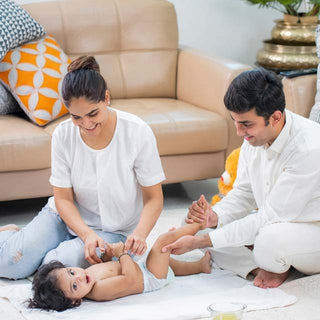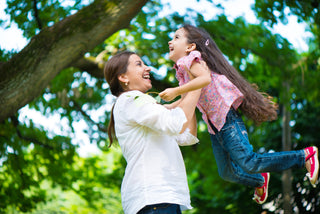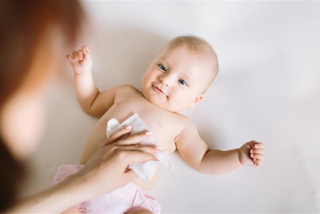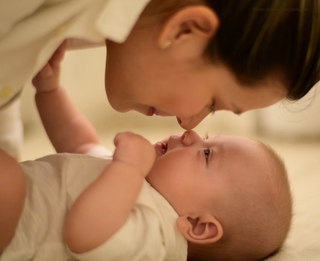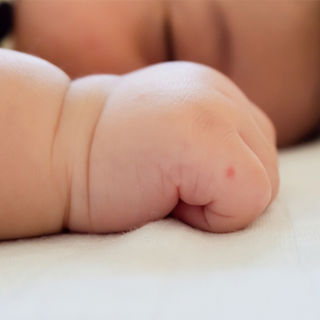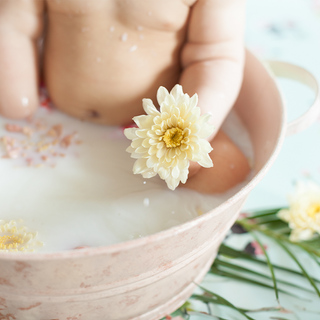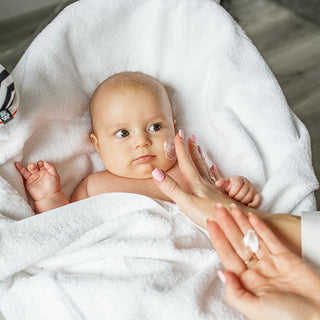“It’s not what you do for your children, but what you have taught them to do for themselves, that will help make them successful human beings”.
- Ann Landers
Inculcating a sense of responsibility in your kids right from an early age fosters independence and accountability, and helps your children grow into mature, capable adults. In this interview, we’re talking to mom-of-three, Zarine Bharda, about how to raise children to be responsible, along with helpful tips and advice that you can implement in your daily lives.

Zarine Bharda is an engineer; lover of food; travel enthusiast; hustler for causes she’s passionate about; soon to be children’s author; and above all else a mother of three.
Q. Thanks for chatting with us, Zarine. Before we delve into our discussion, we always like to start by asking – how has motherhood changed your life and what’s the best thing about being Mom to your three little ones?
Ans. Everything! But the biggest change is how much love there is. The love they have for me, the love I have for them, and the love they share among each other. I am not always a cuddler but when it comes to my kids – anytime, anywhere. My husband, Dara likes to call our kids my little tails and yes sometimes it can be a lot with having them right behind me (literally and figuratively) but having these three little shadows behind me and watching them grow into their own person is amazing. Sometimes I just have to pinch myself as to how these amazing little humans have been created.
Q. How would you define ‘responsibility’ in relation to children?
Ans. That’s tough. There isn’t really one way to define it. When it comes to responsibility, I perceive that word to incorporate respect, independence, teamwork, growth, and encouragement.
Responsibility and independence go hand in hand. When you show a child how to be responsible, it also shows them that you trust them and their independence grows. This also helps to reinforce positive behaviours.
Q. Why do you think it’s essential to teach children to be responsible and accountable for their actions right from an early age? And when it comes to age, how early is early enough?
Ans. As your child grows and they become more engaged, giving responsibility is a necessary step that you take with your child to show that they are also getting more independent. This allows them the opportunity to make good choices for themselves.
Whether it be respect for another or for their material belongings, that is a part of them showing responsibility. Yes, we can teach and guide a child to be responsible but the best way to do that is to show them. If we show our kids that their parents are responsible for their actions and their day to day activities, then they will follow in-step. One of the biggest things is showing them that messing up is okay and when you do, don’t shirk from taking responsibility for it. Own it!
I feel that punishing a child creates and instills fear in a child which then makes them not want to take responsibility for their actions. Take for example, my 2-year-old, Shanaya. I’ll ask her “who spilt this?” or “who coloured all over your hands?” and without a bat of an eye she’ll say her twin sister did. Even though we all know who did it. So instead of scolding her for not telling the truth, I show her that it’s okay that it spilled as it was a mistake and guide her on how she can help clean it up.
One of my favourite kid shows is ‘Daniel Tiger’s Neighborhood’. If only I could get my kids to watch it. One of the biggest lessons they teach is that if you make a bad choice then you should always ask “how can I make it better?”. Isn’t this something we should all be asking ourselves - even as adults?
Remember that each child is different so what you may encourage with one child may not be the same as another. As for age, I would say probably once a child is able to walk, that’s when you can start introducing responsibility to them, but I would not expect much back at that stage.
Q. What are some of the tactics that you use daily to help your children understand responsibility?
Ans. An example would be when it’s time for a child to be responsible for their toys. That includes putting them away at the end of the day. One fun way to incorporate that is to make it a timed activity – “let’s see how many toys you can put in the basket in two minutes!”. This allows them to begin understanding the concept of time management and also respect for their belongings.
Another tactic is when your kids enter the house, if you have a no-shoes rule, create a space to put everyone’s shoes and show them that you do this each time you enter the house and automatically they will follow the same routine.
One of my latest tactics that I use with my 4-year-old is that when he does something that could get him in trouble, i.e., shoving his sisters, kicking, doing something dangerous, instead of shouting at him (let’s be honest – it does happen), I try and stay calm and take him out of the situation and let him know that what he chose was a bad choice. If he isn’t as receptive to the conversation at that time, I’ll give him time to cool off and then re-address the topic as to why what he did wasn’t a good choice and what he could have chosen to do instead.
Check in with your kids. Set aside time where it’s just you and one child and have an open conversation. Behzad, my 4-year-old, is still too young to understand everything but he loves when we have our ‘question time’ each night before bed. During that time, I’ll ask him some questions like: “How was your day?”, “What was something that made you happy today?”, “What was something that made you sad today?” “What was something that you did that was kind today?” “Were you able to help someone today?” Questions like these will at least allow for communication and understanding so that as the child hears these more often, they will then try to have something to tell. Whether it be “yes, I helped Shahnaz pick up her shoes”, or “I was sad because I didn’t get a chocolate today”. To a child these are all important things to them and part of being responsible is allowing them to share their own expressions without any judgment. Show responsibility and don’t instill fear. Fear will not help their growth.
Q. Can you share a few examples of age-appropriate tasks that parents can give out to their children to help them understand responsibility and gain a sense of independence?
Ans. I would probably start at the age of around 1-2 years old. At this age, they love making a mess of all the food they eat. After they’re done and you’ve cleared their plates, give them a damp cloth and give them a chance to wipe up their high chair trays. They’ll love it! It may be more of smearing all the food everywhere but it gives them a chance to partake in the cleaning up. This also gives you a couple more minutes of them being buckled in their chairs while you finish up the dishes or even finish your dinner.
Once your child is eating at the table and in more of a booster chair, give them a chance to bring their own plates to the sink. Warning! Make sure they’re not good dishes – there’s going to be a lot of clunks and thumps with dishes being dropped or thrown in because they’re still too tiny to place it in properly. My 2-year-old twins love doing this – I think more for the noise but hey it’s a start!
All my kids love to vacuum if I let them. This is the perfect task for a 4-year-old. Either with a vacuum (supervised) or with a broom. I usually just guide them to sweep towards the doors or to sweep the leftovers to the grass for the birds to eat. This way the lack of sweeping directionality doesn’t matter as much; as long as it moves to the general area. All of my kids love the idea of ‘feeding the birds’ so every once in a while, they’ll say “feed the birds?” with food that should be going in their mouths instead.
A few other examples is at 18 months to 2 years, children should be able to pick up most of their own toys. At 2 years, being able to brush their teeth so that they have a sense of independence. Yes, you would need to still go in and brush it for them properly, but maybe give them a chance to do it by themselves sometimes. 3-year-olds should be able to help you put laundry in to the machine or sort the dirty pile by different colours or textures. 4-year-olds should know when to try to help others. For example: to open a door, hold an elder’s hand, bring a tissue to wipe the tears. These are all things that lead to responsibility but also kindness.
Q. We bet you have a repository of funny parenting experiences. Can you recall any funny incident that might have occurred with your kids while you were trying to teach them an important lesson?
Ans. As a mom of three, one of the things I’ve learned is that you need to figure out FAST how to go places with all three kids in tow. I had taken them all with me to the Central department store in Mumbai. My son had wanted to go get a shopping cart for us to put the clothes in that I was carrying. That was a kind and responsible gesture from him. I’m sure there was also some motivation to be able to ride it as well. But while he had gone to get the cart, the girls and I were walking past the ladies underwear section. The girls both paused at the mannequins and listed each of their parts out along with the colour of the bra and underwear. It was a proud moment! Haha. All the store clerks were very impressed. One thing I believe is important is that a child should know the proper name – no cute names - for all their anatomy.
I also find that when I’m teaching the kids something or showing them how to do something, I feel like everything I say is just falling on deaf ears. I know that’s not completely the case since there are many times when I’ll catch Behzad giving the same spiel I give him to one of his sisters that may be having a meltdown. It’s definitely nice to hear him share encouraging words with his sisters. Shanaya – “Mummy milkkkkk, milkkk now!” (as she starts pulling down or up my shirt in public). Behzad to Shanaya – “Shanaya – mummy can’t give you milk now. Later, okay?” Behzad to Shahnaz – “please sit nicely, it’s okay don’t cry – I’ll give you a hug.” Usually this will go on until I give in or we succeed at distracting her, or Dara comes in to rescue us, cause let’s face it – the kids listen to him. Lesson of the story is to keep on chugging and don’t let the bad moments take over the good teachings.
Q. Today, more than ever, it’s so important to teach our children to be conscious of and responsible towards our environment. What are some of the simple ways in which one can teach kids to care for and respect the environment?
Ans. I consider our environment being of two parts, the Earth (Mother Nature) and the surroundings.
Let them play outdoors and enjoy what nature has given us. Yes, they will get dirty and also eat some dirt along the way. But this will in turn automatically teach them to nurture and love the things that Mother Nature gives us. This includes teaching and showing your kids that it’s not okay to litter. Show them that there is a place to put trash and help them find the right place to put it.
Another simple way is if you have a garden or even some small plants - let them do the watering. Yes, they may drown a few but give them the responsibility to take care of their own plant. I have definitely found that I need to train my kids to do this because whenever I come back from a work trip, whatever herbs I may have grown are all shriveled to death upon my return.
A new tradition we have started is that for each child’s birthday they get to plant a tree. That gives them the opportunity to nourish it and watch it grow with each year they grow. This year Behzad has chosen a strawberry tree (I’ll need to find a plant somewhere in India) and an apple tree. Involve them in this process and automatically they will show care and consideration for their environment.
In addition to Mother Nature, show them to care for their surroundings. For example, if an elderly person is walking through a door – go and hold the door open for them. Help someone carry something that may be heavy. Sharing the burden across multiple hands makes it so much lighter.
Q. It is said that our children are often our greatest teachers. What are some of the most important lessons that you’ve learnt from your kids?
Ans. To be humble – you might shout at your child for spilling something, but if it was an adult that had done the same thing, would you have reacted the same way? To be non-judgmental – your children are always watching and listening to you. Don’t place judgment on others when you don’t know the full situation. To show humility – you might be walking around on cloud 9, and your kids can bring you back to reality in a second.
Q. Any last tips or advice that you’d like to give to Moms who are trying to inculcate a sense of responsibility and accountability in their kids?
Ans. Don’t shy away from the tough stuff. The questions our children ask should be answered as honestly as possible with real life experiences included. Talk to them as little human beings. Keep demonstrating responsibility and accountability for yourself and your kids will follow suit.





